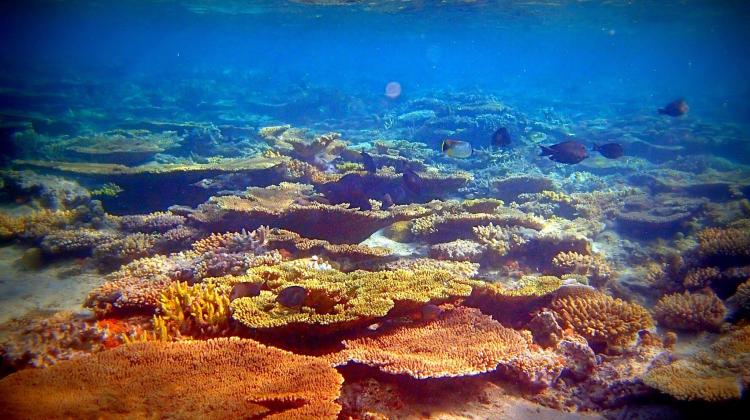Biologist: The benefits of nature can be converted into money
 Photo: Fotolia /
Photo: Fotolia /
Water retention, reducing pollution, aesthetic experience - these are some of the services nature provides to people. The value of these services can be converted into money, which can help authorities make decisions more prudently - says biologist from WWF.
DESTROYING NATURE? WHAT A WASTE!
Development of the concept of the so-called ecosystem services allowed environmentalists to find a common language with economists. With this approach, naturalists are able to demonstrate that conservation can translate into tangible economic benefits and the destruction of ecosystems may be connected with financial losses. With such an approach to nature it is easier to reach the imagination of politicians or policymakers.
"This is a relatively new field of knowledge. At the moment it functions in Poland only in scientific research" - says in an interview with PAP biologist Dr. Przemyslaw Nawrocki from WWF Polska Foundation. The naturalist hopes, however, that the valuation of ecosystem services will be increasingly taken into account in the economic and political decisions.
"In Poland, the approach to services provided by nature is a very simplified - what counts is, for example, how much money you can get from hay from a hectare of meadows or cubic meter of wood from the forest, or how much the water for the water supply costs. And yet there is a whole range of other very important services ecosystems provide" - said Dr. Nawrocki. He explained that the fact that nature supplies the people with materials is just a small slice of environmental services we use.
IN SUCH BEAUTIFUL NATURE...
Such ecosystem services include, for example, cultural functions, which to some extent can be converted into money. "The fact that we see the environment as something beautiful, valuable, is not only a spiritual experience. It has a real impact on the functioning of the body. Aesthetic experiences have a positive effect on the immune system. The fact that we admire the beauty of nature during the holidays and trips, can help us get sick less, and burden the health care system less. And that, of course, translates into savings" - noted the biologist.
Assessment of the value of these services maybe based, for example, on the costs which man bears to reach the place where he wants to relax. This tourism value is calculated, for example, for the part of the Białowieża Forest protected as a national park. It was compared with the value of timber production, which can be obtained from the part of the Białowieża Forest used as an economic forest. "It turned out that the recreational benefits generated by the Białowieża National Park are more than 20 times greater than the economic benefits generated by the Białowieża Forest District" - noted the biologist, citing a study by Dr. Marek Giergiczny from the Faculty of Economic Sciences, University of Warsaw.
Dr. Nawrocki gave the example of London, where the portion of the river hidden for decades under the concrete was uncovered. After restoration of the riverbed and valley, the river began to flow through the park again. "It turned out that not only the number of visitors to the park increased, but also the real estate prices around the place" - noted the naturalist.
"The value of a nightingale singing outside the window can be estimated by asking residents how much they would be ready to pay monthly to prevent the fragment of the park, where the nightingale sings every night, from being turned into a parking lot" - said the researcher.
NATURAL ORDER
"Less well recognized and not so obvious are other ecosystem services - regulatory services" - said Dr. Nawrocki. He explained that this includes absorption of carbon dioxide by the environment and decomposition and absorption of pollutants, e.g. nitrogen and phosphorus in water ("biogenes"). The naturalist explained that such ecosystem services can be accurately valuated.
Another regulatory function of ecosystems is mitigating the effects of extreme events, such as drought or flood. Dr. Nawrocki reminded that water is retained in ecosystems - in the soil, in the river valleys and natural marshes. "But water can also be retained artificially. The construction of a storage reservoir, however, involves significant costs. The retention service of the environment, such as the ecosystem of the river and its valley, can be counted by comparing it with the cost of collecting water in the artificial reservoir" - said the biologist.
Other regulatory functions of the environment include erosion control, pollination and protection against ultraviolet radiation, and even control of the spread of pathogens.
More difficult to valuate are the basic ecosystem services, such as the formation of soil, photosynthesis and oxygen supply, as well as circulation of elements or water in the environment. After all, these services - essential for life on Earth - can not yet be produced artificially.
THE GREEDY LOSE
Dr. Nawrocki cited an important publication in the journal "Nature" of 1997, which showed that the annual ecosystem services at the time reached 33.3 trillion dollars (a trillion is a million million). At that time the gross global product was valued at 18 billion dollars. It turned out that the ecosystem services are worth almost twice as much to humans than goods and services produced by all people. Subsequent studies have shown that 60 percent of the ecosystem services are used excessively, resulting in annual loss of ecosystem services worth 50 billion euros due to unreasonable exploitation.
Naturalist gave the example that in Poland the value of ecosystem services decreased due to not fully justified dredging of rivers. He reported that over the past 5 years in Poland 20 thousand km of rivers have been dug (i.e. approx. 20 times more than the length of the Vistula). "We lost more than we gained from this" - said the naturalist. He admitted that, when calculating the cost-effectiveness of such activities, usually only the potential benefits for local, often greatly exaggerated, are taken into account. Meanwhile, when planning such investments, the authorities should also take into account the fact that dredging a river will affect fish fauna, which will cause losses to anglers. Besides, cutting vegetation on the river bank will give fertilizers and pesticides from farmlands quick access to the river. Another issue is the fact that when digging rivers decreases retention capabilities of valleys - eliminating the meanders and deepening the river accelerates the flow of water, which favours flooding in lower parts of the river. Also important is deteriorating appearance of the landscape after regulation or "maintenance" of the river. According to the naturalist, using better models gain and loss models in the environment would allow to more rationally decide on spatial development and could prevent senseless land degradation.
"In order to be able to continue to use the services that ecosystems provide to us, we should stop our greed. It is important that the development is sensible, sustainable, and not wasteful. With this, nature will be able to continuously supply its services - not only to us but also to future generations" - concluded the biologist.
PAP - Science and Scholarship in Poland, Ludwika Tomala
lt/ mrt/
tr. RL
Przed dodaniem komentarza prosimy o zapoznanie z Regulaminem forum serwisu Nauka w Polsce.

















